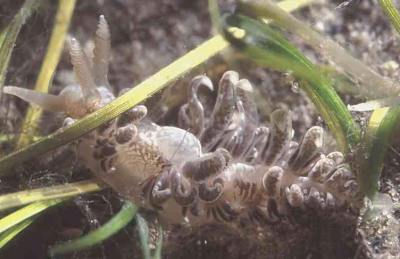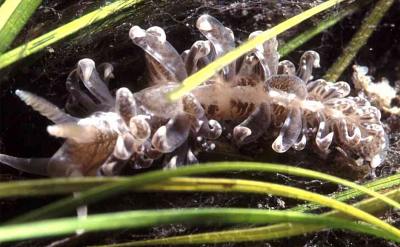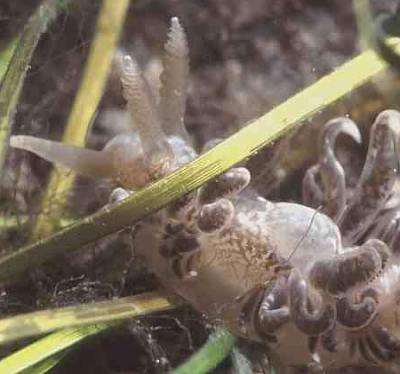Solar powered sea-slug
September 10, 2002
From: Michel Barrabés


Dear Bill,
On July 25th 2002, I found a slug looking like Spurilla neapolitana at Bassin d'Arcachon, France [Atlantic coast]. It was in a meadow of Zostera nana in the intertidal zone. So it was out of water 6 hours a day ... It had the brown network of symbiotic algae you describe, but it's the first time I seen a Spurilla in such a place. I have found it previously at about 5 to 10 meters, on rocks or sand, but at depth where light is very poor in our green waters. And the previous specimen I found where pink or orange or white, but without the brown network. I have sent photos of this pinkish form in a separate message.
PHOTOS: 7 PM on 25/08/02 about 30 mm long (there were 3 specimen from 10 mm to 30mm with their spawn, similar to that of Spurilla) 0.50 m deep at full tide near "Ile aux oiseaux" in the middle of Bassin d'Arcachon, among a meadow of Zostera nana.
Best regards,
Michel Barrabés
France.
m.barrabes@libertysurf.fr
Barrabés, M., 2002 (Sep 10) Solar powered sea-slug. [Message in] Sea Slug Forum. Australian Museum, Sydney. Available from http://www.seaslugforum.net/find/7886
Dear Michel,
Thanks for the interesting photos. Firstly animals in intertidal sea grass beds are largely protected from drying out during low tide by being 'wrapped in' the sea grass leaves which retain considerable amounts of water between the leaves.
Secondly, many of the sea slugs which keep zooxanthellae in their tissues, either have 'forms' which lack zooxanthellae, or go through stages in their life when they lack zooxanthellae. I suspect that those without zooxanthellae are either unable to find zooxanthellae or else are living in an environment in which zooxanthellae cannot survive. As you suggest, poor light at depth may be the reason in this case. Many slugs, including Spurilla obtain their zooxanthellae from the sea anemones they feed on. If the sea anemones that Spurilla is eating lack zooxanthellae then that would explain the pink forms.
What we don't know is how vital the zooxanthellae are for the slug's survival. It is possible that in some species the zooxanthellae are essential, but in most it seems they can survive without them. Whether they can grow to maturity and lay eggs without the nutrition provided by the zooxanthellae is a mystery still to be answered.
Best wishes,
Bill Rudman
Related messages
-
Re: Sargassum sea slugs in Gulf of Mexico [2]
From: Kathe R. Jensen, February 23, 2010 -
Sargassum sea slugs in Gulf of Mexico [2]
From: Denice Drass, February 22, 2010 -
Feeding Spurilla neapolitana from Florida
From: Linda Ianniello, July 25, 2008 -
Mystery from the Everglades, Florida, USA
From: Sophia Floyd, July 18, 2008 -
Spurilla neapolitana predator
From: Joao Pedro Silva, March 31, 2008 -
Spurilla neapolitana in Brazil
From: Daniel Pimpão, January 23, 2006 -
Mystery from St. Vincent Is, Caribbean [1]
From: Les Wilk, November 3, 2005 -
Re: Spurilla neapolitana from Gulf of Mexico [7]
From: Brian Plankis, September 10, 2005 -
Re: Spurilla neapolitana from Gulf of Mexico [6]
From: Brian Plankis, September 9, 2005 -
Re: Spurilla neapolitana from Gulf of Mexico [5]
From: Brian Plankis, August 30, 2005 -
Identity of Brian Plankis's anemone-feeding aeolid
From: Bill Rudman, August 30, 2005 -
Spurilla neapolitana from Saint-Tropez
From: Benjamin David-Testanière, August 26, 2005 -
Re: Spurilla neapolitana from Gulf of Mexico [4]
From: Brian Plankis, August 25, 2005 -
Re: Spurilla neapolitana from Gulf of Mexico [3]
From: Brian Plankis, August 20, 2005 -
Re: Spurilla neapolitana from Gulf of Mexico [2]
From: Brian Plankis, August 11, 2005 -
Re: Spurilla neapolitana from Gulf of Mexico [1]
From: Brian Plankis, August 9, 2005 -
Aeolidiella chromosoma or S. neapolitana
From: Nestor E. Ardila E., August 8, 2005 -
Spurilla neapolitana from Gulf of Mexico
From: Brian Plankis, August 8, 2005 -
Spurilla neapolitana from Portugal
From: Ana Maria Rodrigues, August 5, 2005 -
Spurilla neapolitana from Mexico
From: Juan José Alfaro M, June 1, 2005 -
Re: Phestilla melanobrachia from the Solomon Ids
From: Andrej Jaklin, July 22, 2004 -
Anemone-eating slug from Israel
From: Ami Schlesinger, December 24, 2003 -
Spurilla neapolitana? from Jamaica
From: Ross W. Gundersen, October 22, 2003 -
Spurilla neapolitana from the Bahamas
From: Colin Redfern, October 22, 2003 -
Spurilla neapolitana from Portugal
From: Joao Pedro Tojal Loia Soares Silva, August 21, 2003 -
Re: Pruvotfolia pselliotes? from Dakar [2]
From: Juan Lucas Cervera, August 12, 2003 -
Pruvotfolia pselliotes? from Dakar [2]
From: Marina Poddubetskaia, August 9, 2003 -
Solar powered sea-slug (2)
From: Michel Barrabés, September 10, 2002 -
Articles about Spurilla neapolitana
From: Daniel Pimpão, May 31, 2002 -
Spurilla chromosoma from Colombia
From: Elianny Dominguez , September 26, 2001 -
Re: Information on Spurilla neapolitana
From: Mike Raffa, September 20, 2001 -
Information on Spurilla neapolitana
From: Amar Boubes, January 2, 2001 -
Spurilla neapolitana from Colombia
From: Phanor Montoya, October 29, 2000 -
About red aeolid from Brazil
From: Carlo Magenta-da-Cunha, April 16, 2000 -
Spurilla neapolitana from Brazil
From: Carlo Magenta-da-Cunha, April 15, 2000 -
Re: Parasitic copepods on Spurilla neapolitana
From: Constantine Mifsud, October 20, 1999 -
Parasitic copepods on Spurilla neapolitana
From: Erwin Koehler, October 16, 1999 -
Spurilla neapolitana from Belize
From: Dave Behrens, October 12, 1999 -
Re: Spurilla neapolitana
From: Constantine Mifsud, September 30, 1999 -
Spurilla neapolitana from Hawaii
From: Scott Johnson, September 30, 1999 -
Re: Spurilla neapolitana photo
From: Constantine Mifsud, September 29, 1999 -
Difference between Spurilla and Berghia
From: Carlo Magenta, September 27, 1999 -
Spurilla neapolitana
From: Bill Rudman, September 27, 1999 -
Spurilla neapolitana - distribution
From: Orso Angulo, June 5, 1999 -
Here is a Spurilla neapolitana photo
From: Erwin Koehler, December 11, 1998 -
Spurilla? from Brazil
From: Carlo Magenta, December 10, 1998
